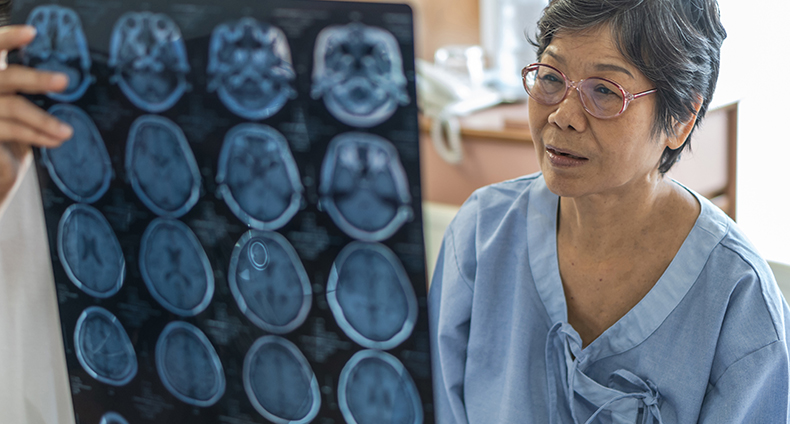
NO RECOVERY NO FEE Free Case Review
Louisville Delayed Treatment of Strokes Attorneys
When you or a loved one suffer harm due to delayed medical care in Kentucky
A stroke is a medical emergency that requires immediate and specialized care to prevent severe and potentially life-altering consequences. When healthcare providers fail to recognize the signs of a stroke or delay necessary treatment, the results can be devastating for patients and their families.
At Garcia & Coman, our Kentucky attorneys understand the profound impact of delayed stroke treatment and the lasting effects it can have on a person's life. Our compassionate team of attorneys is dedicated to advocating for victims of delayed treatment, seeking justice, and holding negligent parties accountable for their actions. If you or a loved one has experienced the tragic consequences of delayed stroke care, we are here to support you through this difficult journey and fight for the compensation you deserve. Our team has over 150 years of combined experience and has help recover more than $3 billion for consumers across the country. We can help you, too.
NO RECOVERY NO FEE Free Case Review
What is a stroke?
The Centers for Disease Control and Prevention (CDC) reports every 40 seconds, someone in the United States has a stroke. Further, every three minutes and 14 seconds, someone dies of a stroke. They also note that “Every year, more than 795,000 people in the United States have a stroke. About 610,000 of these are first or new strokes.”
Per the CDC, a stroke occurs “when something blocks blood supply to part of the brain or when a blood vessel in the brain bursts. In either case, parts of the brain become damaged or die. A stroke can cause lasting brain damage, long-term disability, or even death.”
There are three types of strokes:
- Ischemic, the most common type of stroke. This occurs when blood clots or other particles block the blood vessels to the brain.
- Hemorrhagic, which occurs when “when an artery in the brain leaks blood or ruptures (breaks open). The leaked blood puts too much pressure on brain cells, which damages them.”
- Transient ischemic attack (TIA), also known as a "mini-stroke." It is a temporary interruption of blood flow to the brain that causes stroke-like symptoms.
The most important thing to note about strokes is that they must be treated as soon as possible. The CDC notes “Patients who arrive at the emergency room within 3 hours of their first symptoms often have less disability 3 months after a stroke than those who received delayed care.”
This means recognizing the symptoms of a stroke immediately and providing rapid response and care.
What are the symptoms of a stroke?
The symptoms of a stroke can vary depending on the type of stroke and the part of the brain that is affected. However, some common symptoms of a stroke include:
- Sudden weakness or numbness on one side of the body. This can affect the face, arm, or leg.
- Sudden difficulty speaking or understanding speech. This can make it difficult to speak or understand what others are saying.
- Sudden trouble seeing in one or both eyes. This can cause blurred vision, double vision, or loss of vision in one eye.
- Sudden dizziness, imbalance, or trouble walking. This can make it difficult to walk or stand up straight.
- Sudden, severe headache. This can be a sign of a serious stroke.
If you or someone you know experiences any of these symptoms, it is important to seek medical attention immediately. Early treatment can help to reduce the damage caused by the stroke and improve your chances of recovery.

How should ischemic strokes be treated?
The treatment of a stroke depends on whether it is an ischemic stroke (caused by a blood clot blocking a blood vessel in the brain) or a hemorrhagic stroke (caused by a burst blood vessel). Both types of strokes require urgent medical attention. Time is of the essence when treating strokes to minimize brain damage and improve the chances of recovery.
For victims of ischemic stroke, possibly the single best treatment is a tissue plasminogen activator (tPA), a clot-busting medicine that should be administered within three hours to be fully effective. tPA can dissolve the blood clot and restore blood flow to the brain, minimizing the risk of long-term damage from a stroke. Failure to administer this life-changing medication can lead to serious consequences, even fatal ones, for stroke victims.
The Louisville stroke negligence attorneys of Garcia & Coman fight for victims and families. Contact us if a healthcare professional:
- Refused to administer tissue plasminogen activator (tPA)
- Delayed administration of tPA
- Delayed diagnosis of a stroke
- Delayed treatment of a stroke
- Refused to treat a stroke
What are the complications of ischemic strokes?
Strokes can cause several complications, including:
- Physical disabilities. Strokes can damage the brain, which can lead to physical disabilities such as paralysis, weakness, or difficulty walking.
- Cognitive problems. Strokes can also damage the brain's cognitive functions, which can lead to problems with memory, thinking, and judgment.
- Emotional problems. Strokes can also lead to emotional problems such as depression, anxiety, and mood swings.
- Speech problems. Strokes can damage the brain's speech centers, which can lead to problems with speaking, understanding speech, or swallowing.
- Vision problems. Strokes can damage the brain's vision centers, which can lead to problems with vision such as blurred vision, double vision, or blindness.
- Pain. Strokes can cause pain, which can be mild or severe.
- Seizures. Strokes can sometimes trigger seizures.
- Death. In some cases, strokes can be fatal.
The severity of the complications of a stroke will depend on the size and location of the stroke. The earlier a stroke is treated, the less likely it is to cause complications.
Who is liable for my delayed treatment of stroke in Louisville?
The liability for delayed treatment of strokes depends on the specific facts of the case. However, there are a few potential liable parties that may be responsible for your stroke injuries, including:
- Hospitals
- Nursing homes
- Emergency room staff
- Assisted living facilities
- Physicians
- Nurses
The attorneys at Garcia & Coman will hold all responsible parties accountable for the harm you or your loved one have suffered.
Do you have a delayed treatment of stroke attorney near me?
Garcia & Coman has offices at 312 S. Fourth Street, Suite 700, Louisville, KY 40202. We’re right down the street from Jefferson County Court.
Skilled delayed treatment of strokes attorneys serving Kentucky
If you or a loved one has suffered harm due to delayed stroke treatment, it's essential to seek legal counsel from our experienced attorneys. We can help determine who may be liable for the negligence, gather evidence to support your claim, and advocate for your right to seek fair compensation for your damages. Call our Louisville offices or fill out our contact form today to schedule a consultation.
We only collect attorney fees if we win your case. Our lawyers also serve families throughout the U.S. from our offices in Long Beach, Los Angeles, Phoenix, and New Orleans. Our services are available in both English and Spanish.
Se habla español.


